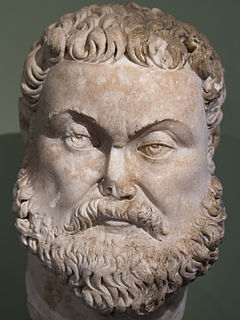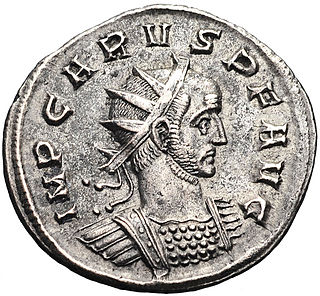See also
| This disambiguation page lists articles about people with the same name. If an internal link led you here, you may wish to change the link to point directly to the intended article. |
Marcus Aurelius was a name used by men from the Roman Empire and afterwards. The earliest so called was the emperor Marcus Aurelius.
| This disambiguation page lists articles about people with the same name. If an internal link led you here, you may wish to change the link to point directly to the intended article. |

Diocletian was a Roman emperor from 284 to 305. Born to a family of low status in Dalmatia, Diocletian rose through the ranks of the military to become a cavalry commander of the Emperor Carus's army. After the deaths of Carus and his son Numerian on campaign in Persia, Diocletian was proclaimed emperor. The title was also claimed by Carus's surviving son, Carinus, but Diocletian defeated him in the Battle of the Margus.
The 280s decade ran from January 1, 280, to December 31, 289.
Year 282 (CCLXXXII) was a common year starting on Sunday of the Julian calendar. At the time, it was known as the Year of the Consulship of Probus and Victorinus. The denomination 282 for this year has been used since the early medieval period, when the Anno Domini calendar era became the prevalent method in Europe for naming years.

Commodus was Roman emperor with his father Marcus Aurelius from 177 until his father's death in 180, and solely until 192. His reign is commonly considered to mark the end of the golden period in the history of the Roman Empire known as the Pax Romana.

Constantius I, commonly known as Constantius Chlorus, was a Roman Emperor. He ruled as Caesar from 293 to 305 and as Augustus from 305 to 306. He was the junior colleague of the Augustus Maximian under the Tetrarchy and succeeded him as senior co-emperor of the western part of the empire. Constantius ruled the West while Galerius was Augustus in the East. He was the father of Constantine the Great and founder of the Constantinian dynasty.

Numerian was Roman emperor from 283 to 284 with his older brother Carinus. They were sons of Carus, a general raised to the office of praetorian prefect under Emperor Probus in 282.

Maximian was Roman emperor from 286 to 305. He was Caesar from 285 to 286, then Augustus from 286 to 305. He shared the latter title with his co-emperor and superior, Diocletian, whose political brain complemented Maximian's military brawn. Maximian established his residence at Trier but spent most of his time on campaign. In late 285, he suppressed rebels in Gaul known as the Bagaudae. From 285 to 288, he fought against Germanic tribes along the Rhine frontier. Together with Diocletian, he launched a scorched earth campaign deep into Alamannic territory in 288, temporarily relieving the Rhine provinces from the threat of Germanic invasion.

Carinus was Roman emperor from 283 to 285. The elder son of emperor Carus, he was first appointed Caesar and in the beginning of 283 co-emperor of the western portion of the empire by his father. Official accounts of his character and career, which portray him as debauched and incapable, have been filtered through the propaganda of his successful opponent, Diocletian.

Carus was Roman Emperor from 282 to 283, and was 60 at ascension. During his short reign, Carus fought the Germanic tribes and Sarmatians along the Danube frontier with success.
Gaius Avidius Cassius was a Roman general and usurper. He was born in Cyrrhus, and was the son of Gaius Avidius Heliodorus, who served as praefectus or governor of Roman Egypt, and Julia Cassia Alexandra, who was related to a number of royal figures, including her descent from both Augustus and Herod the Great. He began his military career under Antoninus Pius, rising to the status of legatus. He served during the Parthian war of Lucius Verus, in which he distinguished himself, for which he was elevated to the Senate, and later made Imperial legate. During the Bucolic War, he was given the extraordinary title of Rector Orientis, giving him Imperium over all of the eastern provinces of the Roman Empire.

The gens Aurelia was a plebeian family at ancient Rome, which flourished from the third century BC to the latest period of the Empire. The first of the Aurelian gens to obtain the consulship was Gaius Aurelius Cotta in 252 BC. From then to the end of the Republic, the Aurelii supplied many distinguished statesmen, before entering a period of relative obscurity under the early emperors. In the latter part of the first century, a family of the Aurelii rose to prominence, obtaining patrician status, and eventually the throne itself. A series of emperors belonged to this family, through birth or adoption, including Marcus Aurelius and the members of the Severan dynasty.
The office of Roman Emperor went through a complex evolution over the centuries of its existence. During its earliest phase, the Principate, the reality of autocratic rule was masked behind the forms and conventions of oligarchic self-government inherited from the Roman Republic. The emperor had no specific office unless he chose to occupy the Republican office of consul.
The accession on November 20, 284, of Diocletian, the lower-class, Greek-speaking Dalmatian commander of Carus's and Numerian's household cavalry, marked a major departure from traditional Roman constitutional theory regarding the Emperor, who was nominally first among equals during the Principate. Whereas before Emperors had worn only a purple toga and were greeted with deference, Diocletian wore jewelled robes and shoes, and required those who greeted him to kneel and kiss the hem of his robe. In many ways, Diocletian was the first monarchical Emperor, and this is symbolised by the fact that the word dominus ("Lord") rapidly replaced princeps as the favoured word for referring to the Emperor.

The Nerva–Antonine dynasty was a dynasty of seven Roman Emperors who ruled over the Roman Empire from AD 96 to 192. These Emperors are Nerva, Trajan, Hadrian, Antoninus Pius, Lucius Verus, Marcus Aurelius, and Commodus. The first five of them are commonly known as the "Five Good Emperors".

Pannonia Superior, lit. Upper Pannonia, was a province of the Roman Empire. Its capital was Carnuntum. It was one on the border provinces on the Danube. It was formed in the year 103 AD by Emperor Trajan who divided the former province of Pannonia into two parts: Pannonia Superior and Pannonia Inferior. The province included parts of present-day states of Austria, Croatia, Hungary, Slovakia, and Slovenia.

Marcus Aurelius Sabinus Julianus was a Roman usurper against Emperor Carinus or Maximian. It is possible that up to four usurpers with a similar name rebelled in a timeframe of a decade, but at least one of them is known by numismatic evidence.
Cornelius Repentinus was a Roman Senator who was active in the 2nd century AD. He held a number of positions during the reigns of emperors Marcus Aurelius, Commodus and Didius Julianus, which included suffect consul and Urban prefect of Rome.
Germanicus is a cognomen used by the Julio-Claudian family, given to all of Nero Claudius Drusus' male descendants due to his victory in Germania. As a Roman victory title, it was also given to other Romans due to their glory in Germania.